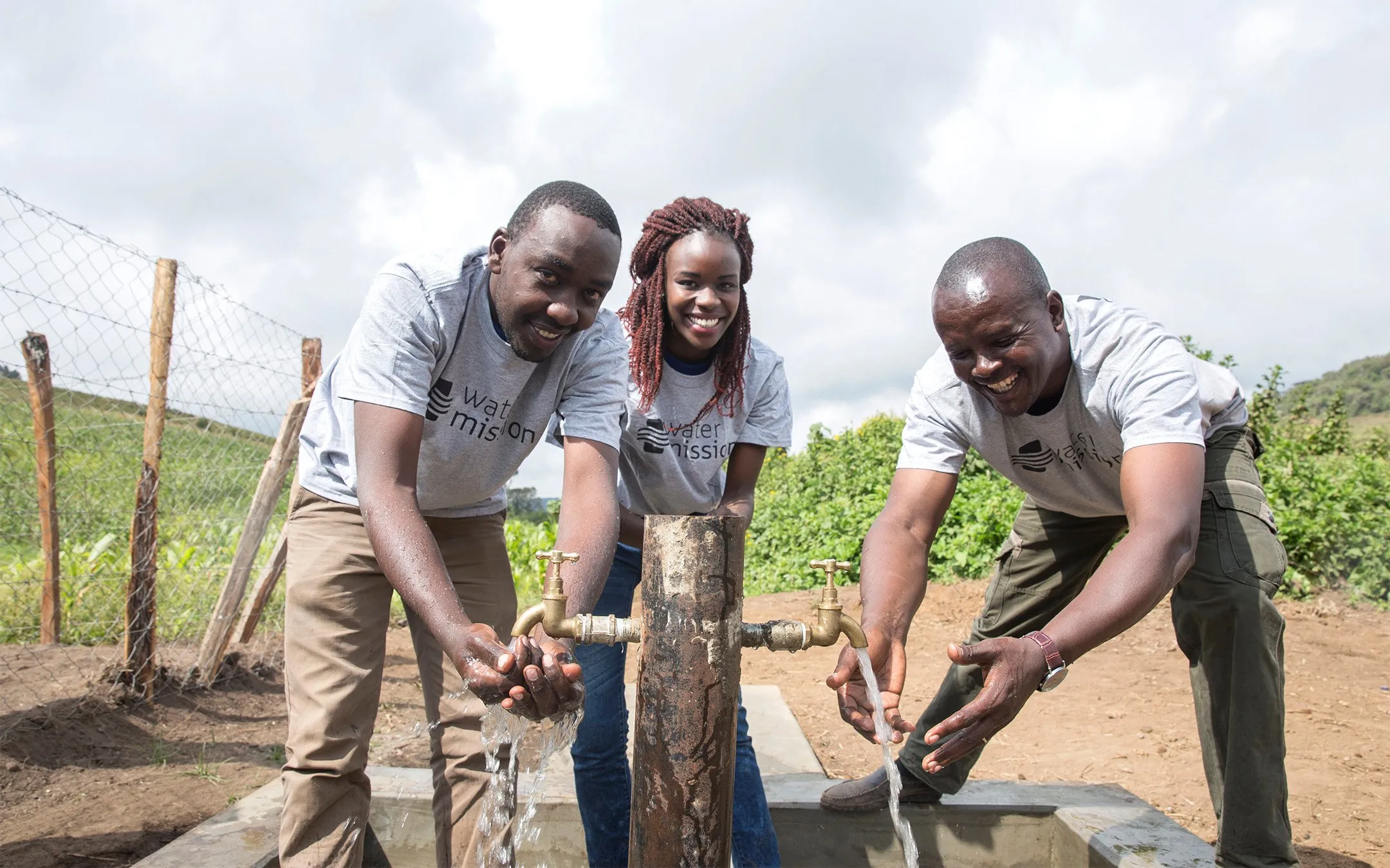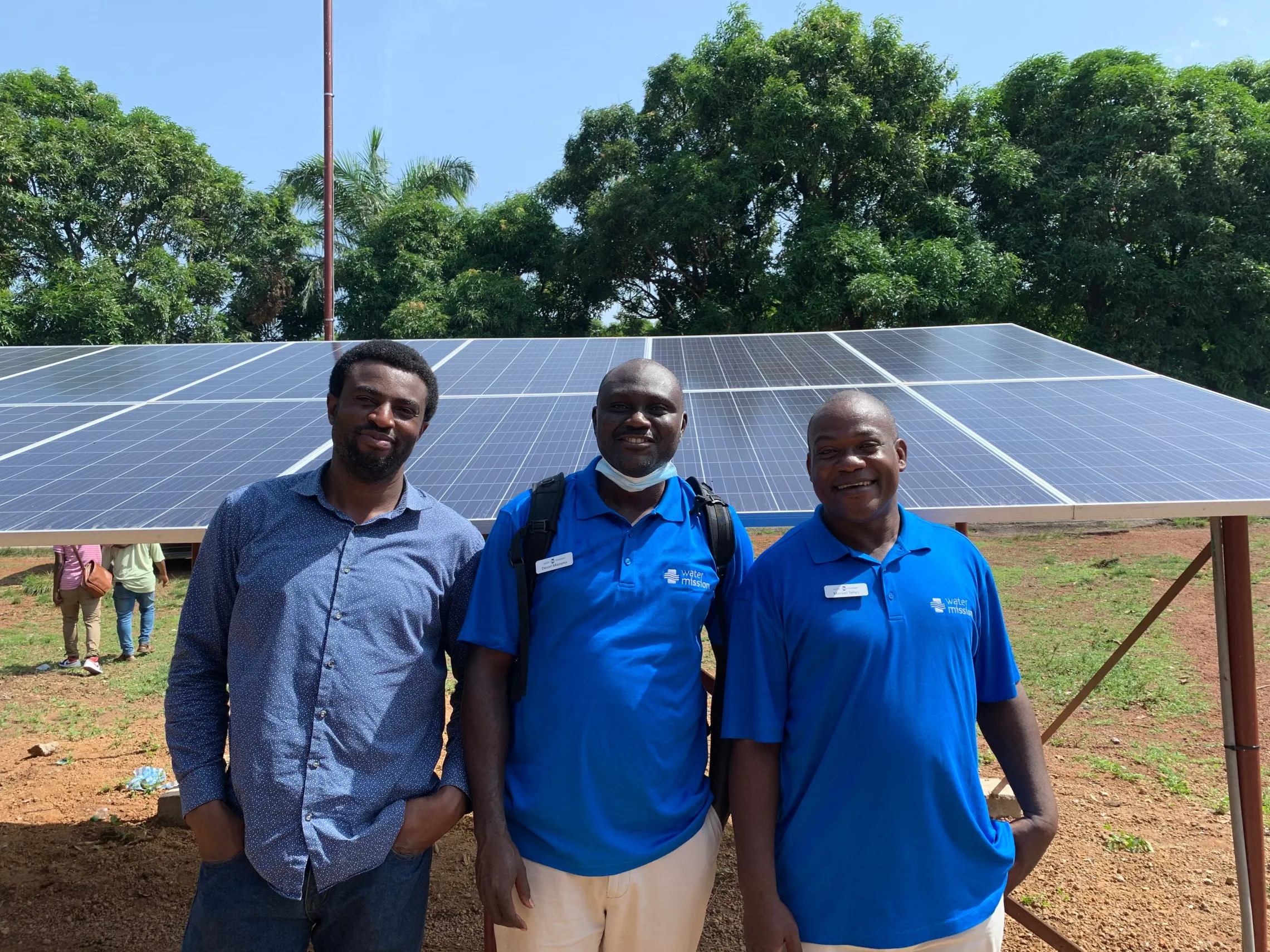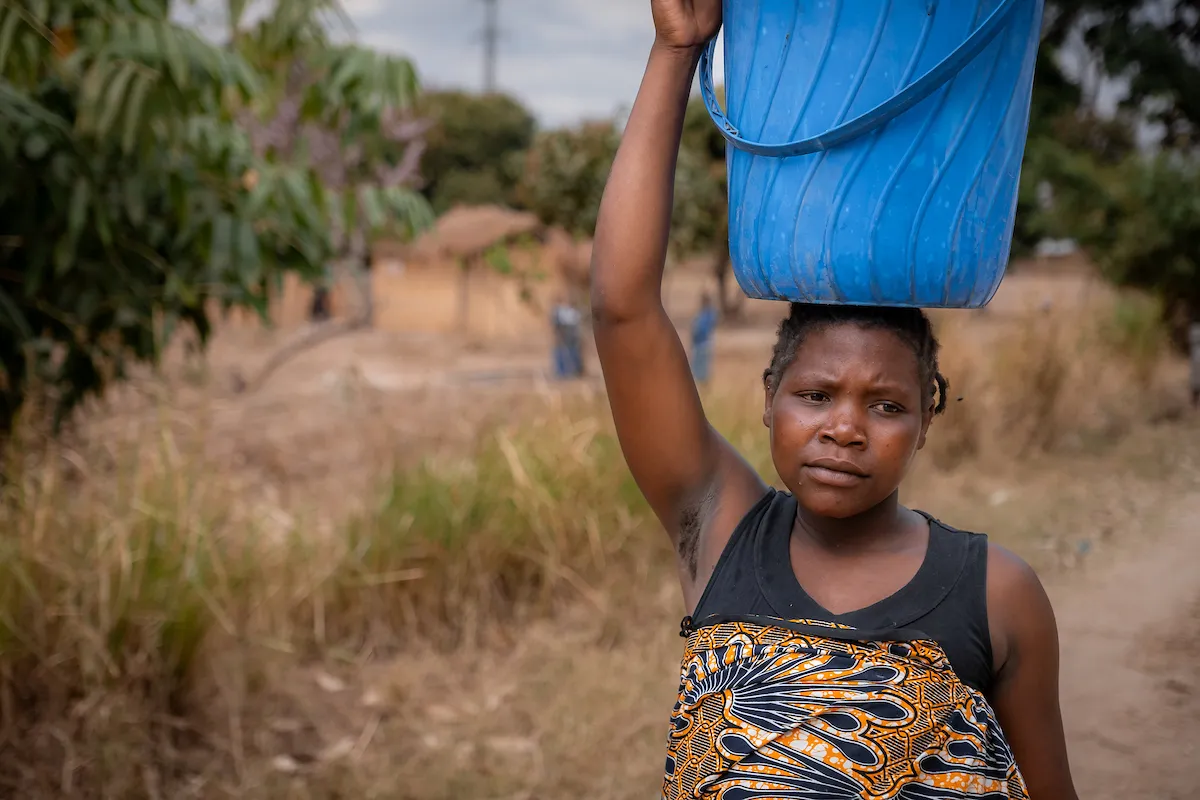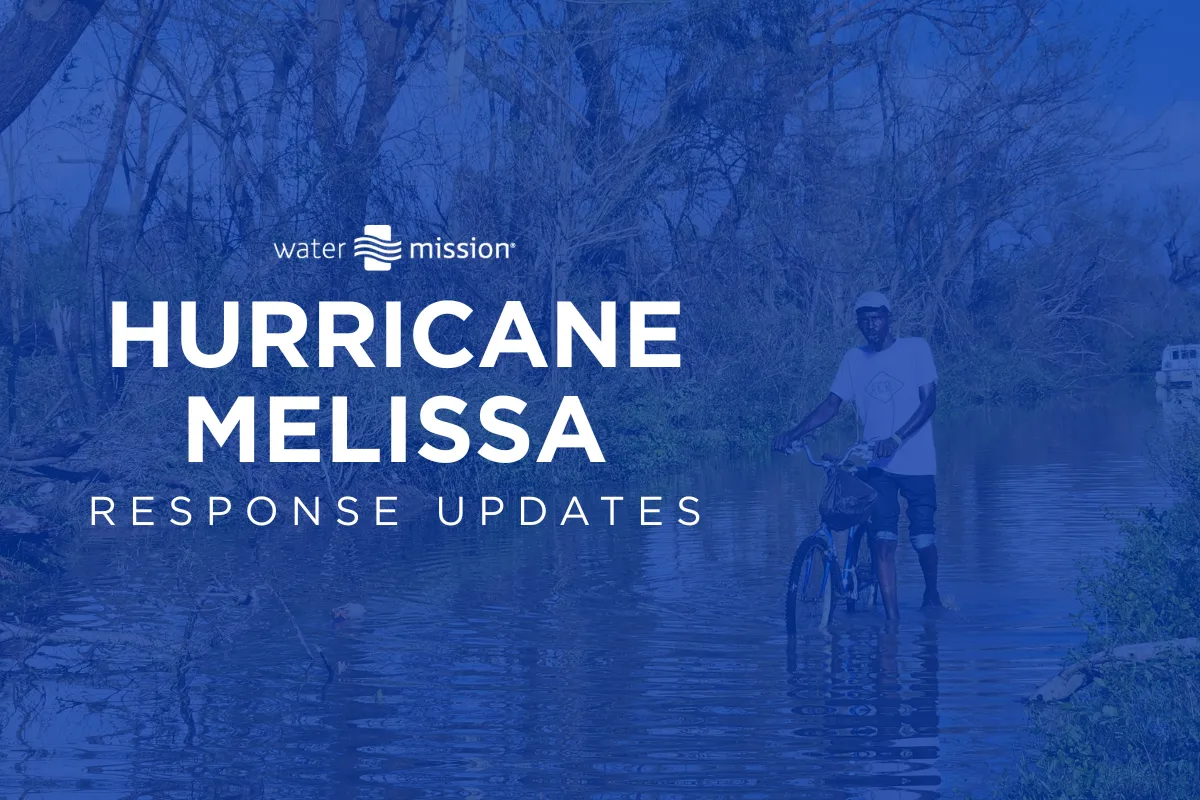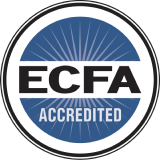Rising to the Challenge: International Volunteering
 Jim Honeycutt accepting an award honoring the work of Water Missions International from Yoweri Museveni, the President of Uganda
Jim, a retired engineer, found his faith later in life, and explains that it was the Lord who led him to a life of service in Africa. “There was this lady I was in small group with,” Jim remembers, “and she had a relationship with a pastor in the western part of Kenya. She visited him every year and spent a couple of weeks there. And she asked me to go so I went with her. She was going into villages and praying with people and preaching to them. I was basically in the back seat of the car watching, and I saw a lot of broken down water equipment.”
The broken water equipment intrigued Jim. When he returned home he started planning a return trip to Africa. He raised the funds necessary to go back and fix the broken water systems he saw, but when he returned the following year the project didn’t go as he’d envisioned. “We did repair them,” he explains, “but it was a very traumatic thing. I’d budgeted something like 30 days and it took me 60 days. It was totally frustrating.” Unprepared and unaware of the challenges cultural differences could cause, Jim went over budget as well as over the planned timetable. “I was naïve,” he admits as he looks back on that first project in Africa. “I went over there thinking I could conduct a project like I could [in the U.S.].”
Hoping to continue working to combat the global water crisis in Africa, Jim approached Water Missions International in 2008 and offered his services. Jim had previously worked with WMI founder George Greene III before the Greenes founded the nonprofit in 2001, and understood the level of engineering expertise that went into WMI’s solutions. Since his first posting as a volunteer in Malawi, Jim has mainly worked alongside staff in Uganda on projects in their country as well as institutional and community development projects in the neighboring nations of Tanzania and the Democratic Republic of the Congo.
Despite the challenges and frustrations service work in Africa has presented, Jim speaks passionately about the importance of continued work there. “You can see you’re needed over there and if you’re one of the people that think that God speaks through…then you see that that’s what you’re supposed to be doing. And I actually get lots of satisfaction out of it, even when it’s frustrating,” he smiles.
Jim Honeycutt accepting an award honoring the work of Water Missions International from Yoweri Museveni, the President of Uganda
Jim, a retired engineer, found his faith later in life, and explains that it was the Lord who led him to a life of service in Africa. “There was this lady I was in small group with,” Jim remembers, “and she had a relationship with a pastor in the western part of Kenya. She visited him every year and spent a couple of weeks there. And she asked me to go so I went with her. She was going into villages and praying with people and preaching to them. I was basically in the back seat of the car watching, and I saw a lot of broken down water equipment.”
The broken water equipment intrigued Jim. When he returned home he started planning a return trip to Africa. He raised the funds necessary to go back and fix the broken water systems he saw, but when he returned the following year the project didn’t go as he’d envisioned. “We did repair them,” he explains, “but it was a very traumatic thing. I’d budgeted something like 30 days and it took me 60 days. It was totally frustrating.” Unprepared and unaware of the challenges cultural differences could cause, Jim went over budget as well as over the planned timetable. “I was naïve,” he admits as he looks back on that first project in Africa. “I went over there thinking I could conduct a project like I could [in the U.S.].”
Hoping to continue working to combat the global water crisis in Africa, Jim approached Water Missions International in 2008 and offered his services. Jim had previously worked with WMI founder George Greene III before the Greenes founded the nonprofit in 2001, and understood the level of engineering expertise that went into WMI’s solutions. Since his first posting as a volunteer in Malawi, Jim has mainly worked alongside staff in Uganda on projects in their country as well as institutional and community development projects in the neighboring nations of Tanzania and the Democratic Republic of the Congo.
Despite the challenges and frustrations service work in Africa has presented, Jim speaks passionately about the importance of continued work there. “You can see you’re needed over there and if you’re one of the people that think that God speaks through…then you see that that’s what you’re supposed to be doing. And I actually get lots of satisfaction out of it, even when it’s frustrating,” he smiles.
 Jim training Ugandan staff on the TradeWater Community Development model
But it can be frustrating. Cultural differences mean differing standards, different approaches to problem solving, and entirely different ways of thinking. For many people, the challenges cultural difference present can be overwhelming or discouraging, but Jim says he’s never felt disheartened. Instead, when asked about the issues that can arise, his eyes light up and he grins as he explains, “It’s fascinating. You go against people who think so entirely different than you. It’s totally, totally fascinating that we think so differently—that we can look as the same thing and have two completely different thoughts.”
“The thing I think is the most important thing that we do for the staff over there is the training,” Jim insists. Training the staff in the African country programs has been a large part of Jim’s role as an international volunteer. While many technicians and engineers have had a university level education, their knowledgebase isn’t necessarily on par with the level of standards WMI promotes. Many international volunteers work with in-country staff to ensure that the technicians in Honduras can adhere to the same standards as technicians in Malawi. Their work encourages consistency across our nine country programs and professional development, or technical development, for our staff.
Most of all, it’s the investment in the future that Jim values. “We might not be there forever and [the in-country staff] could probably do it without us if [someone] ran us out of the country. In Uganda there are at least three or four people who could probably start up a business and maintain these projects. They have the skill to do that now, and they wouldn’t have if we weren’t there.”
Jim training Ugandan staff on the TradeWater Community Development model
But it can be frustrating. Cultural differences mean differing standards, different approaches to problem solving, and entirely different ways of thinking. For many people, the challenges cultural difference present can be overwhelming or discouraging, but Jim says he’s never felt disheartened. Instead, when asked about the issues that can arise, his eyes light up and he grins as he explains, “It’s fascinating. You go against people who think so entirely different than you. It’s totally, totally fascinating that we think so differently—that we can look as the same thing and have two completely different thoughts.”
“The thing I think is the most important thing that we do for the staff over there is the training,” Jim insists. Training the staff in the African country programs has been a large part of Jim’s role as an international volunteer. While many technicians and engineers have had a university level education, their knowledgebase isn’t necessarily on par with the level of standards WMI promotes. Many international volunteers work with in-country staff to ensure that the technicians in Honduras can adhere to the same standards as technicians in Malawi. Their work encourages consistency across our nine country programs and professional development, or technical development, for our staff.
Most of all, it’s the investment in the future that Jim values. “We might not be there forever and [the in-country staff] could probably do it without us if [someone] ran us out of the country. In Uganda there are at least three or four people who could probably start up a business and maintain these projects. They have the skill to do that now, and they wouldn’t have if we weren’t there.”
 Jim examining the water bottle the Ugandan staff have given him at his farewell party
Despite the challenges the job of an international volunteer can present, including long stretches of time away from family, Jim doesn’t count the sacrifices he makes to go where he’s needed, but says it’s worthwhile. Though he’s just arrived him after spending the spring in Uganda, Jim acknowledges that he could likely return to WMI’s Africa programs soon if there is a special project that needs extra assistance or new staff that need special training.
“My best memory,” he smiles as he remembers, “was the sendoff I got the first time I left. That was an honor. One of the many good things that they do in that culture is that they do celebrate...They gave a party for me when I left. They each stood up and they told me something about me…Undoubtedly they meant it. They remembered things and told things that I told them and that they had remembered which was so honoring.” Jim shakes his head and admits, feelings evident in his voice, “I cried. I’ve cried maybe five times in my life, but I’m telling you, it was just so emotional.”
Jim examining the water bottle the Ugandan staff have given him at his farewell party
Despite the challenges the job of an international volunteer can present, including long stretches of time away from family, Jim doesn’t count the sacrifices he makes to go where he’s needed, but says it’s worthwhile. Though he’s just arrived him after spending the spring in Uganda, Jim acknowledges that he could likely return to WMI’s Africa programs soon if there is a special project that needs extra assistance or new staff that need special training.
“My best memory,” he smiles as he remembers, “was the sendoff I got the first time I left. That was an honor. One of the many good things that they do in that culture is that they do celebrate...They gave a party for me when I left. They each stood up and they told me something about me…Undoubtedly they meant it. They remembered things and told things that I told them and that they had remembered which was so honoring.” Jim shakes his head and admits, feelings evident in his voice, “I cried. I’ve cried maybe five times in my life, but I’m telling you, it was just so emotional.”
Related Impact Stories
